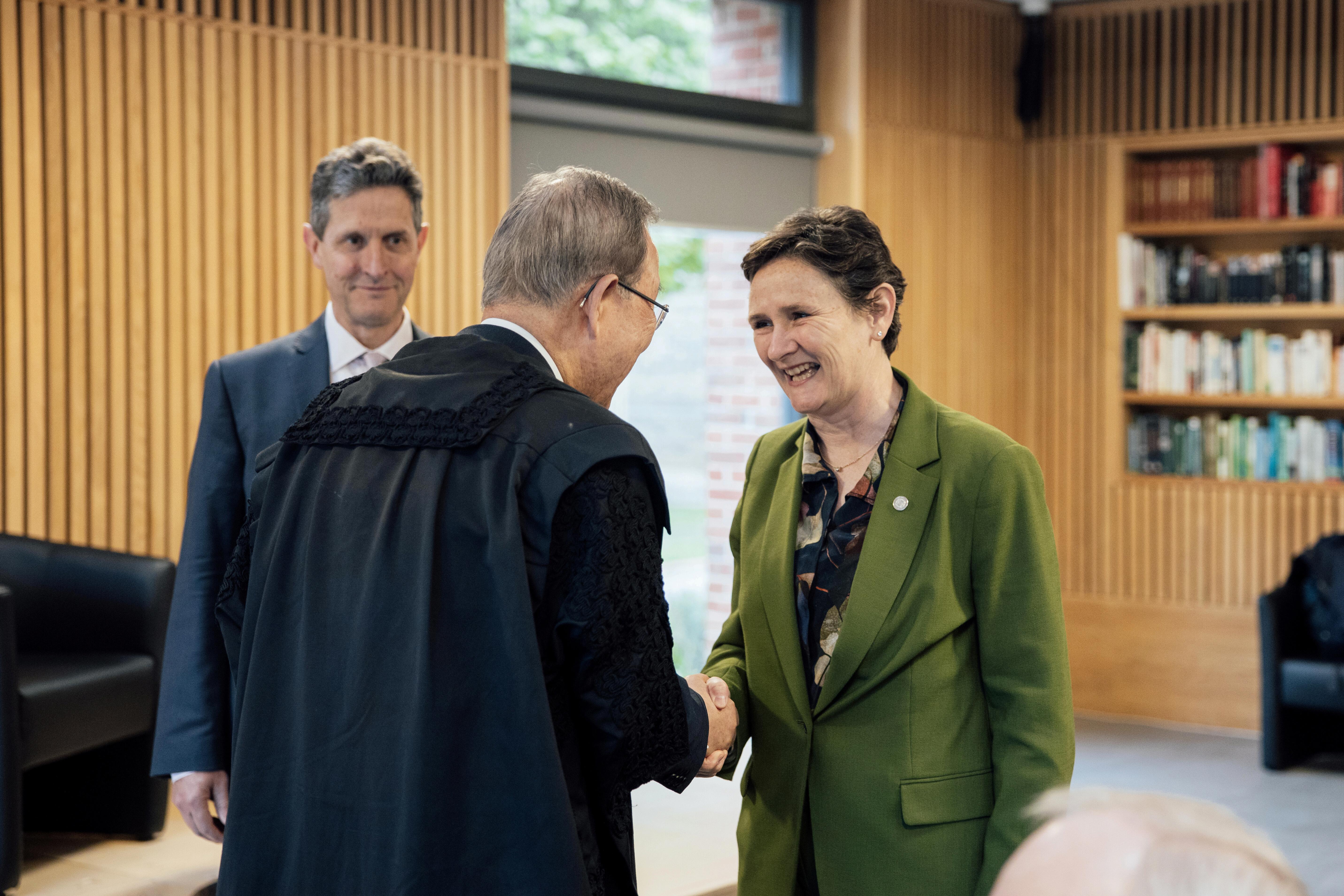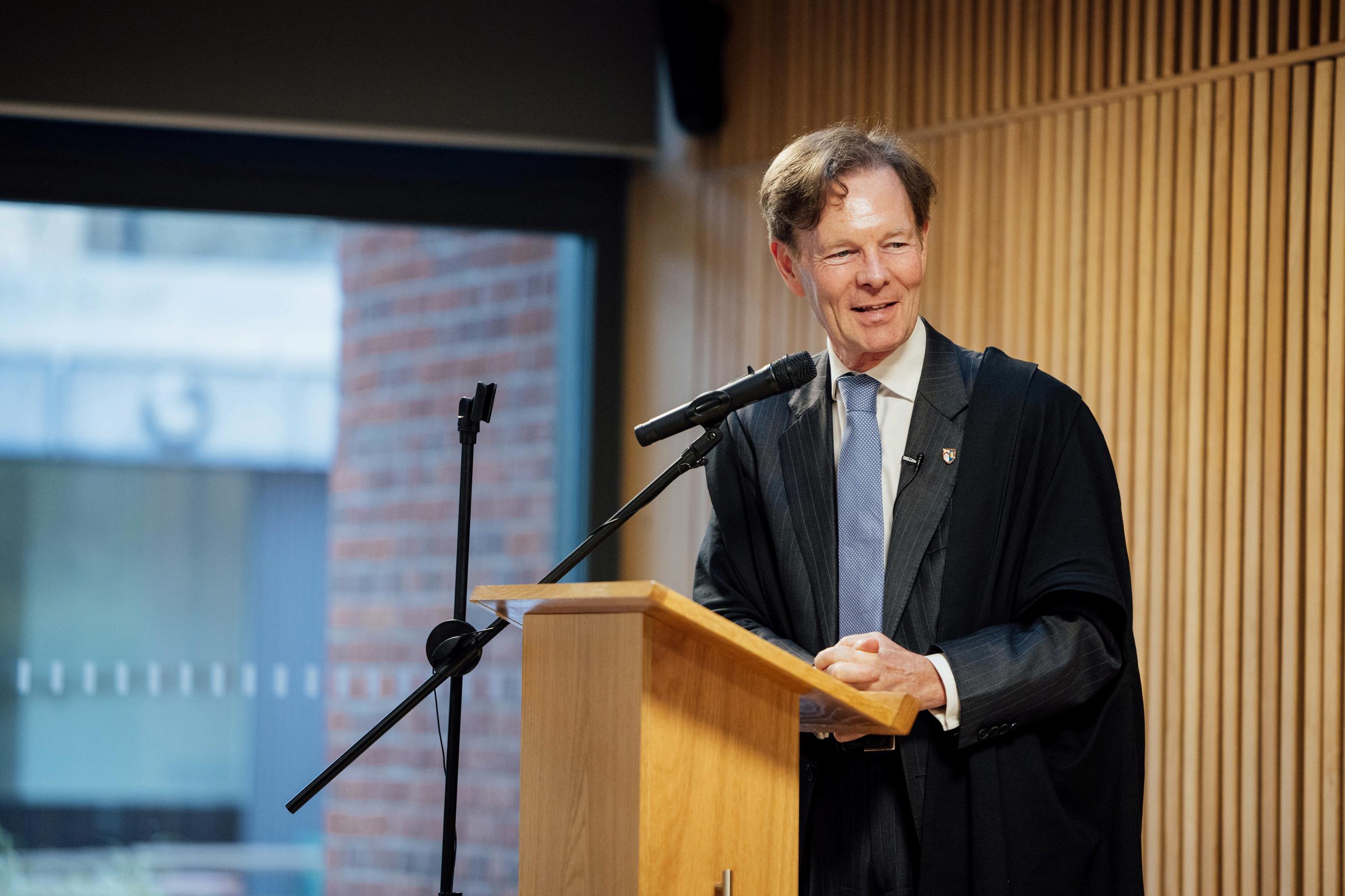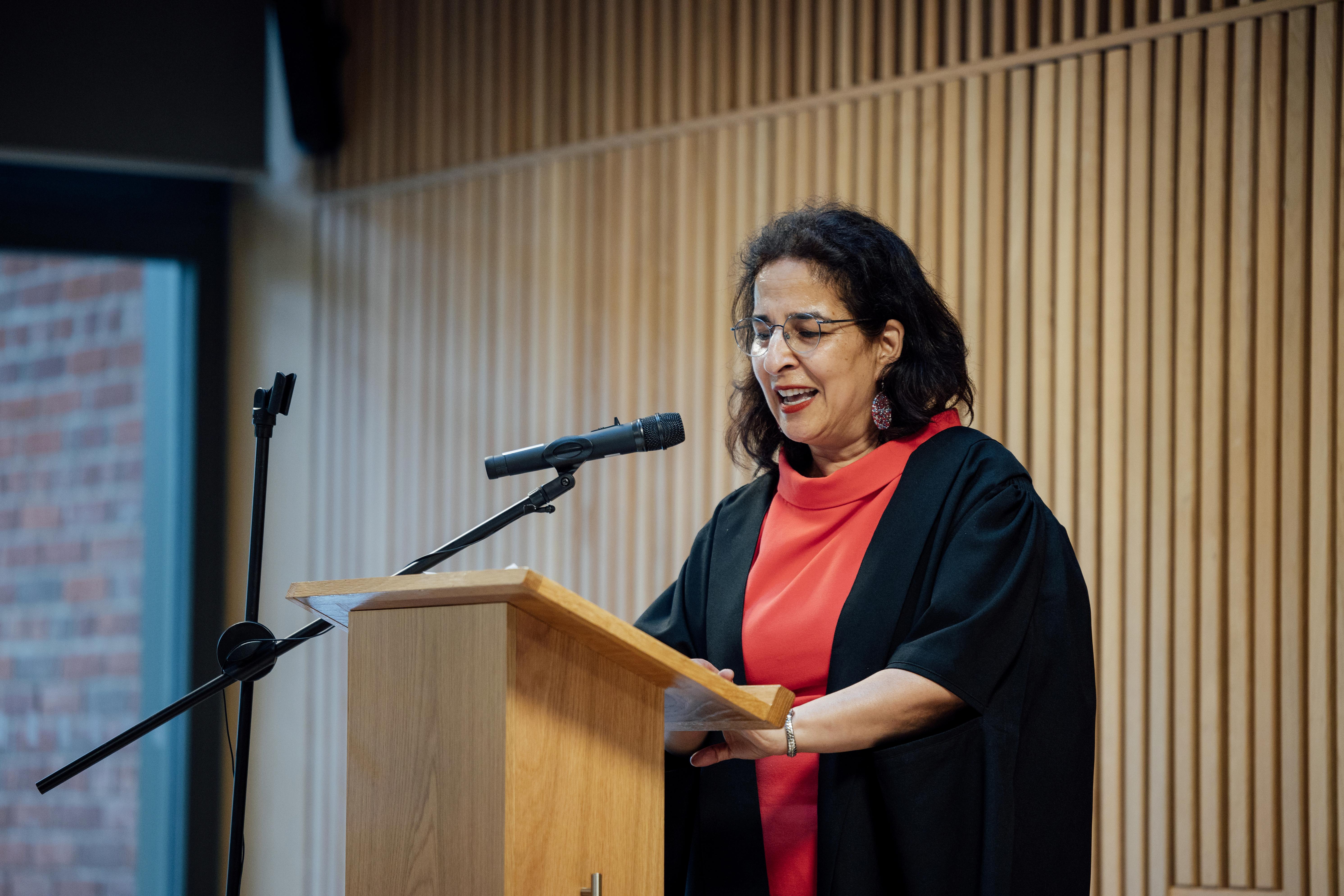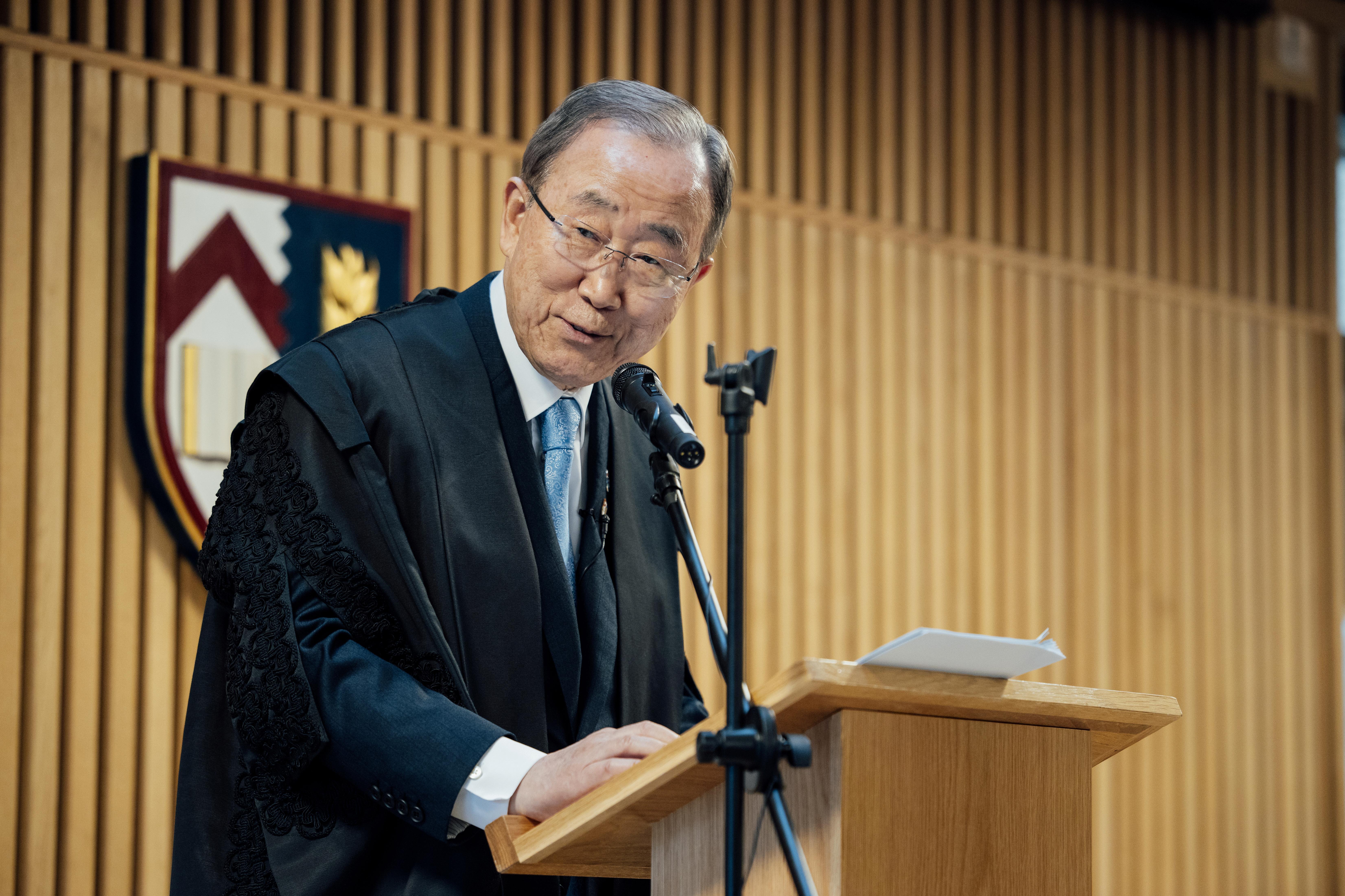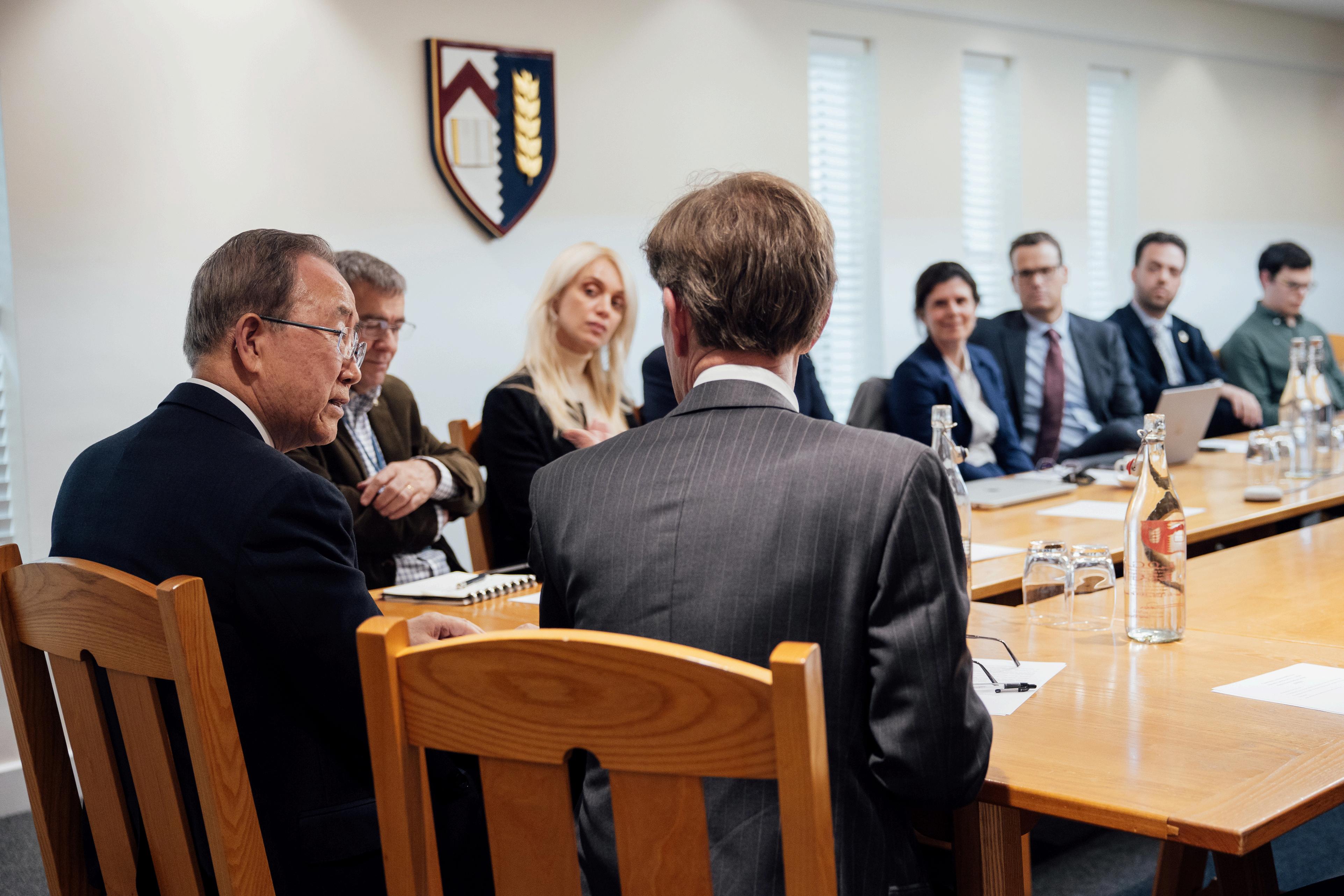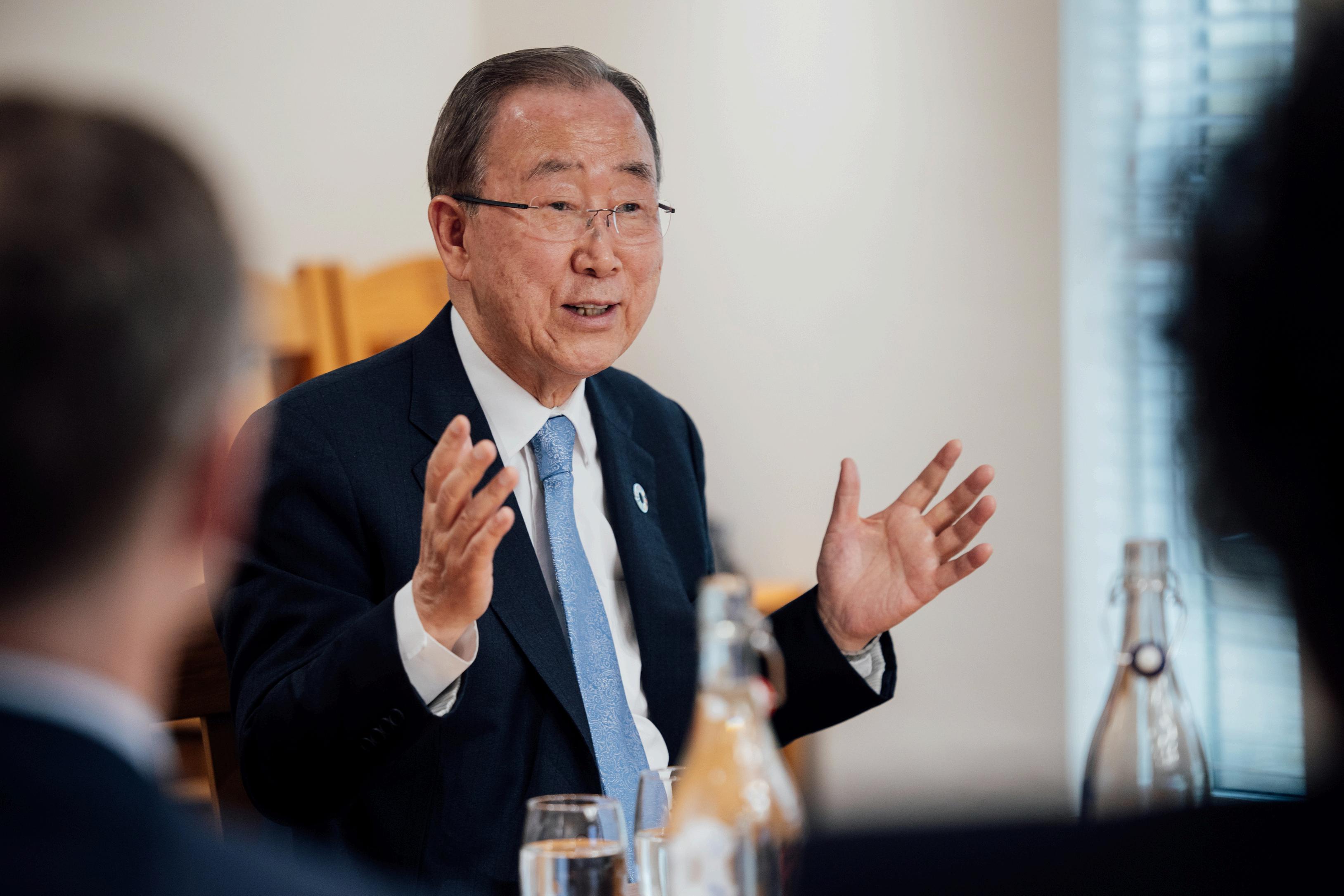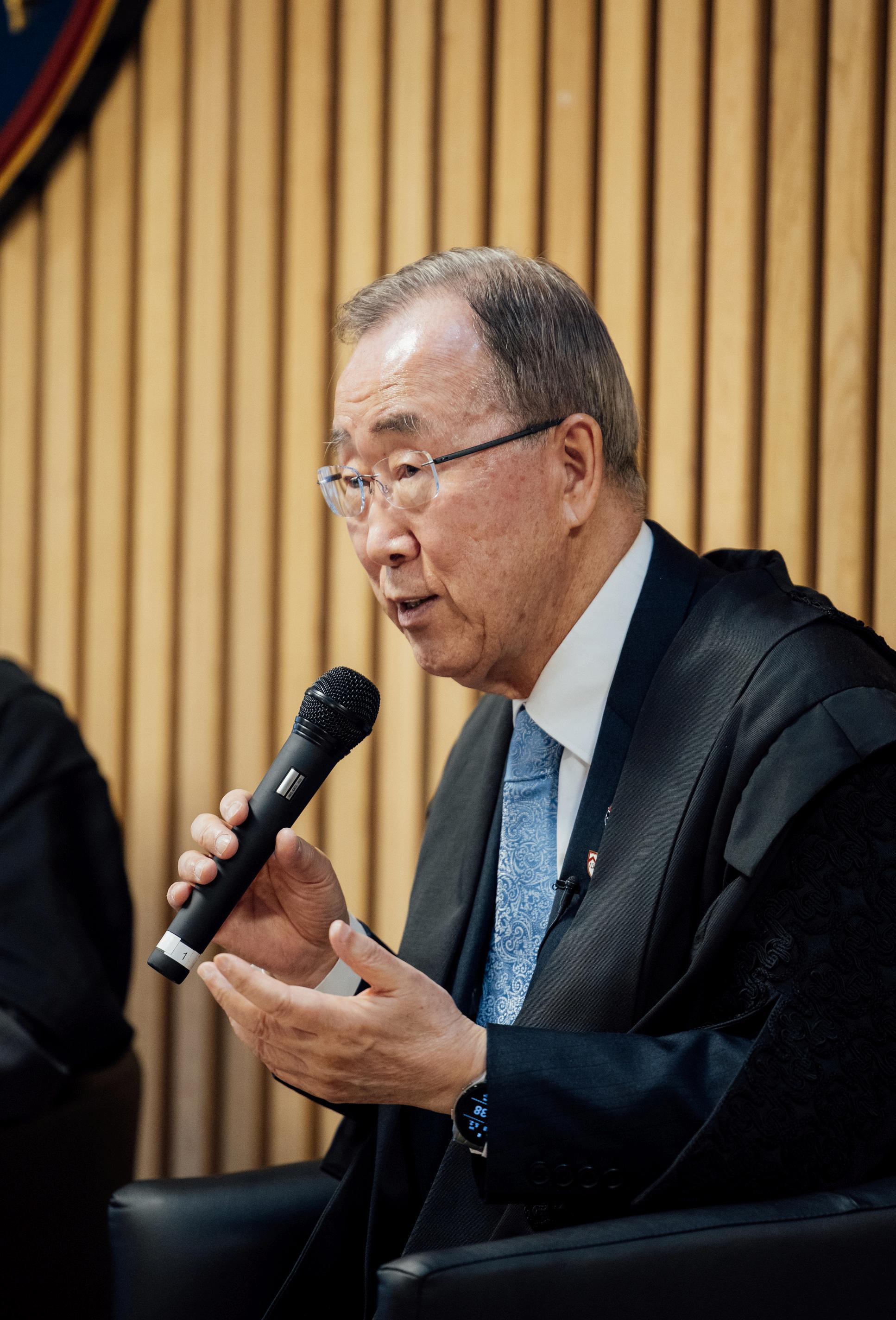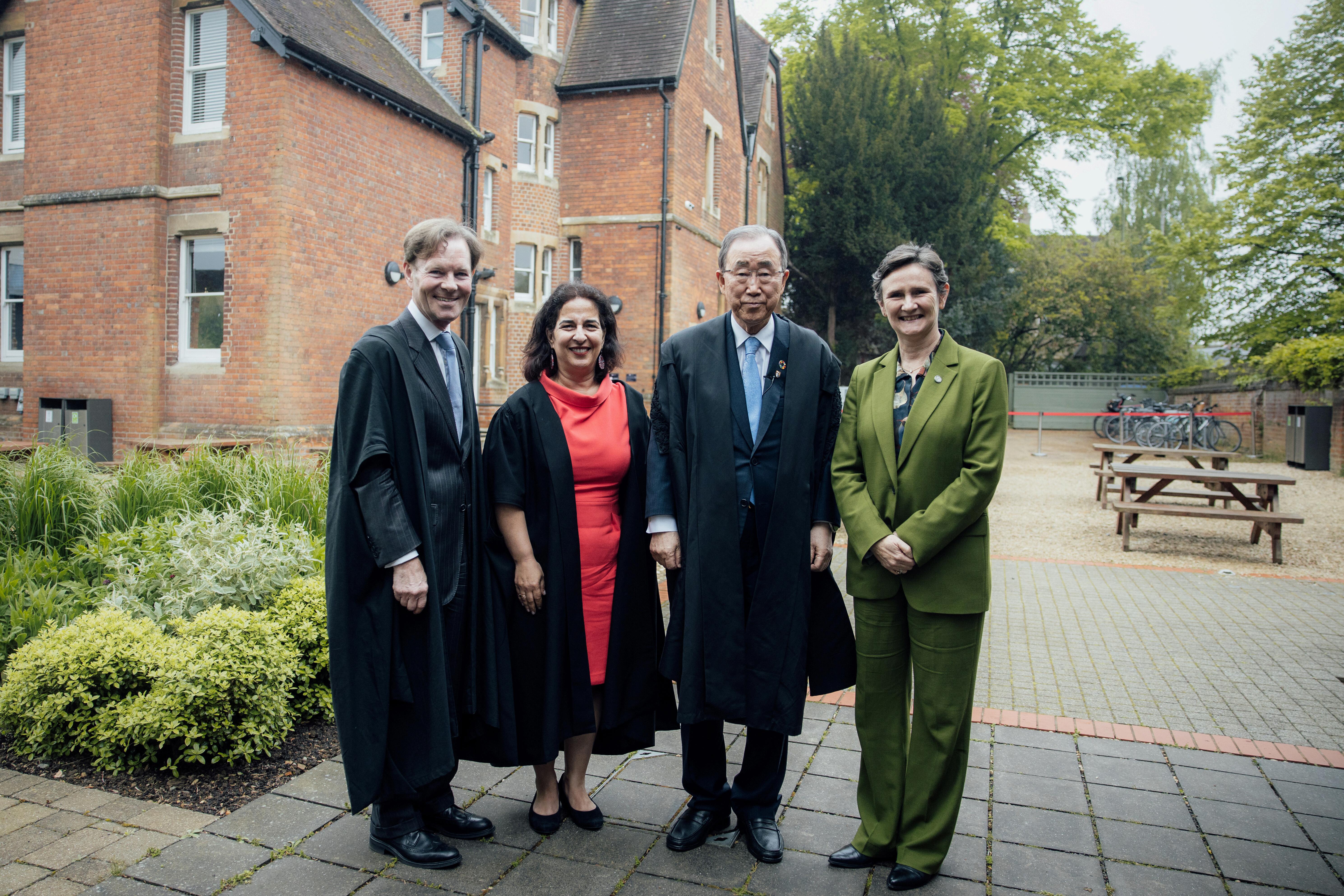Human Rights in a Fractured World
Ban Ki-moon
Thank you, Professor Nazila Ghanea, for your kind introduction.
Professor Irene Tracey, Vice Chancellor of Oxford University and Kellogg Fellow; Professor Jonathan Michie, President of Kellogg College; Professor Myles Allen, Director of Oxford Net Zero; students, distinguished guests, ladies and gentlemen: today, I am honoured to join Kellogg College’ s Bynum Tudor Fellowship here at Oxford University. Particularly, I’ m filled with pride to join the other Bynum Tudor Fellows at Kellogg College. Above all, I am delighted to know that His Majesty King Charles III is also a Bynum Tudor Fellow
In addition, I had the pleasure of working alongside Bynum Tudor Fellow Dr Phumzile Mlambo-Ngcuka, when she was the Executive Director of UN Women
I am also impressed to hear of Bynum Tudor Fellow Sir David Brown’ s role as Chair of the Bletchley Park Trust, with which I know Kellogg College has a special connection Indeed, Alan Turing and the other brilliant code-breakers at Bletchley Park played a huge role in protecting human rights globally at that time, advancing victory in the Second World War
So, I do believe I am in good company here!
At the same time, I am pleased to be joining a college that shares my guiding values and passions This is true regarding the vital importance of education, including lifelong learning; as well as the great need for social and environmental sustainability.
In this connection, I was honoured to attend a meeting earlier this afternoon of the College’ s Commission on Sustainability Data. I am of the view that this innovative Commission has the potential to make a major contribution to global efforts to tackle climate change In addition, I believe it exemplifies the deep importance of the multi-stakeholder approach
It is also a true pleasure to be back at Oxford once again, one of the world’ s greatest universities I’ m pleased to be in the company of the University Vice Chancellor, and fellow Kellogg College Fellow, Professor Irene Tracey, as well as the Director of the University’ s impressive Net Zero efforts, Professor Myles Allen
Finally, by way of introduction, it is a great honour to have been invited to deliver the inaugural lecture in what I’ m sure will prove to be an important annual series of human rights lectures, here at Kellogg College, Oxford
“What are the great challenges facing the world, and what should we be doing about them in response?”
Students, distinguished guests, ladies and gentlemen, we are living in an unprecedented era of new, interconnected crises and elevated global uncertainty. So, this is indeed an appropriate venue to ask, “What are the great challenges facing the world, and what should we be doing about them in response?”
One might hope that over time, the human race would gain experience in how to tackle problems and progress in a linear manner Unfortunately, this does not appear to be how history actually progresses. Indeed, today in the year 2024, we are confronted with just as many problems as ever, perhaps even more. And the scale of these problems also seems to be as great as ever; again, in some cases perhaps even greater than those we faced previously Let me briefly focus on the following ten pressing challenges.
First, war and armed conflict are with us now, and the risks of regional wars taking on escalatory global dimensions are growing. Also, the US-China confrontation is intensifying.
Second, the dangers of international financial crises and recession remain unresolved Our globalised economies are still vulnerable to seismic transnational shocks.
Third, much of the progress in tackling extreme poverty has stalled due to conflicts, COVID-19, and the climate crisis
Fourth, alongside this, there has been growth in inequality of income, wealth, power and geography
Fifth, human rights abuses continue unabated, across the world.
Sixth, different movements and protests have drawn attention to systemic problems of gender and race inequalities
Seventh, the threat of future pandemics is as great as ever, after COVID-19 caused such extraordinary disruptions
Eighth, unregulated AI and other new technologies pose serious threats to the world, including for human rights.
Ninth, the deepening climate crisis threatens all of humanity and the earth’ s ecosystems
And tenth, there appears to be a significant mental health and wellbeing crisis, particularly amongst the young, who perhaps fear they will inherit all of these problems
In a moment, I will reflect on how some of these issues were confronted while I was Secretary-General of the United Nations. But, above all, I will address the question “What should we do about such problems?”
Clearly, each of these areas calls for different sorts of responses. But in my experience, one can say that in most cases there are certain fundamental requirements These include, first, education, research, and knowledge Second, international cooperation, partnership, and action. Third, mass mobilisation, and protest. Fourth, tackling vested interests and confronting impunity And fifth, quiet diplomacy behind the scenes
In this connection, please allow me to now turn to my experience of dealing with these global problems. I had the great honour of leading the United Nations, for ten years from January 2007 to December 2016 Yet, the beginning of my tenure was certainly difficult.
On October 9th, 2006, the very same day my election as United Nations’ 8th SecretaryGeneral was confirmed, North Korea shocked the world with its first nuclear test, which caused a 4.2 magnitude earthquake on the Korean Peninsula, and led to swift global condemnation. This surely was not coincidental It cast a dark shadow as I prepared to lead the United Nations, knowing my first major international crisis was already waiting for me upon my arrival in New York.
The SDGs provide humanity, and our planet, with a collaborative blueprint to ensure the future we want. I believe that it is always important to win global support and realise the SDGs to ensure that people across the world can enjoy human rights in the broadest sense, including economic and social rights The SDGs themselves were designed to be underpinned with a rights-based approach to guide holistic sustainable development processes. Indeed, over 90 percent of all SDG targets overlap with normative human rights obligations Notably, this includes tackling extreme poverty. This is critical since, if millions are living in extreme poverty, their rights are inherently limited by this very fact. Sustainable Development Goal 1, to end poverty in all its forms everywhere, like the other 16 SDGs, is specifically informed by related human rights instruments. These include the right to life, the right to an adequate standard of living, the right to social security, and the equal rights of women in economic life I’ m pleased to say that we did, during those ten years under my leadership at the UN, see hundreds of millions lifted out of extreme poverty thanks to the SDGs and the Millennium Development Goals (MDGs)
Third, I am very proud of the progress made on women ’ s rights and gender equality during my time at the UN. Indeed, while we must not lose sight of the need for broad economic and social progress, at the same time, we need to focus on specific areas to synergise enabling action Empowering women and girls and promoting gender equality is essential to solving the world’ s challenges such as the SDGs, resolving conflicts, and taking climate action As UN Secretary-General, I devoted much of my time and energy to advancing the rights of women around the world and fighting for gender equality. From my very first day at the UN to my last, this was my guiding priority. In this context, I launched the UN Women in 2010 to ensure the organisation does more to deliver on gender equality and women ’ s empowerment. And, I appointed the UN’ s first female peacekeeping commander, MG Kristin Lund of Norway The bottom line is that women ’ s rights
are absolutely central to the three defining pillars of the UN: peace and security, sustainable development, and human rights; as well as each and every one of the other 16 UN SDGs. But if we continue to hold back half of the world’ s population, it’ s simply impossible to reach our full potential on these three pillars So, we must do more for women and girls everywhere to realize a sustainable future. We have been fortunate to have had great leaders of UN Women, including Dr Phumzile MlamboNgcuka from 2013 to 2021 – who I am delighted to be reacquainted with, as a fellow Bynum Tudor Fellow at Kellogg College!
Fourth, I made strenuous efforts for the adoption of the Paris Climate Change Agreement While much has been achieved in developing renewable energy and scaling it, there is so much more to do – most particularly in regard to the urgent reduction of CO2 and other greenhouse gas emissions into the atmosphere, as well as climate adaptation and financing. The Paris Climate Agreement provides us with our best hope to persevere over the dire climate threats to the earth. As I repeatedly stressed; we don’t have a plan B, because we don’t have a planet B either From catastrophic flooding in Dubai to historic bleaching of the world’ s coral reefs to the alarming rise in ocean temperatures to climateimpacted commodity shortages to unprecedented wildfires in unlikely places like Canada, the climate crisis is no longer a future threat. It is here and now!
As such, we need elevated ambition, action, and political will to slash emissions, implement the Paris Climate Agreement, and safeguard the future of both humanity and our planet At the heart of such action, there is no other way than to drastically cut carbon emissions on the road to net zero and ensure a just transition. This will address energy shortages, improve human well-being, and catalyse cooperation And the role of both young people and universities is crucial to synergise partnership action.
to Sudan and beyond; we must remember that the respect of human rights is a universal value that humanity agreed upon. All UN Member States are obligated to protect the human rights of their citizens, or those they occupy Indeed, it is their fundamental duty, based on both the United Nations Charter and the Universal Declaration of Human Rights.
As such, we must remain vigilant to always protect and promote human rights But we also need to better tackle the other challenges we are facing. Otherwise, not only will those problems persist, but when they reach crisis levels, that also leads to human rights being eroded From the list of ten global challenges I referred to, the protection and promotion of human rights is the focus of this lecture, but as I have just argued, they are all extremely significant and often interconnected, not only in their own right, but also with regards to human rights The most striking case in this regard is perhaps the climate crisis, which threatens humanity globally.
The bottom line is that climate change is precipitating insecurity, conflict, displacement, biodiversity loss, mass crop failures, drought, flooding, famine, and public health risks all around the world. And it could get much worse This would be devastating to hundreds of millions who may see their social and economic rights stripped away. Working to protect and enhance human rights, therefore, must be accompanied by action to tackle the climate crisis
The UN Intergovernmental Panel on Climate Change (IPCC) says that we have just seven years to cut emissions by fifty percent in order to restrict the planet’ s temperature rise to 1 5 degrees before climate change becomes catastrophic As such, robust action, underpinned by partnership, cooperation, and a rights-based approach must steer us all collectively forward. It is critical for us to hit net-zero targets by 2050 And to do so, we
must turn existing international commitments, most notably the Paris Climate Change Agreement, into decisive action. Climate change is a common global challenge demanding collective global solutions. And all of us have a common stake in forging sustainable solutions in response
I would like to conclude my remarks today by highlighting the following three points.
First, while I am pleased that during my time as UN Secretary-General, we did make progress on protecting and promoting human rights, in many cases that momentum has since been lost.
And, when other security and socio-economic problems are exacerbated, human rights all too often lose out. I am of the view that this underscores the great importance and utility of this annual lecture series on human rights Indeed, we do need to maintain a focus on human rights, especially civil society, and I highly congratulate Kellogg College for helping do so through this vital initiative.
Second, we need to retain a broader focus, in order to make critical progress on achieving the UN Sustainable Development Goals, and, most importantly and urgently, in redoubling action at all levels to tackle the climate crisis. With this in mind, I reiterate my appreciation for the role of Kellogg College in launching the Commission on Sustainability Data. This warrants a round of applause!
And finally, I would like to briefly reflect on my lessons learned over the years, particularly from my ten years of service as UN SecretaryGeneral. I believe that those ten years were marked by many successes. And these successes were the result of the hard work of all those who work for the United Nations, and of the many millions who support these efforts, whether in governments, NGOs, the private sector, universities, or other parts of civil society. Collectively, we strived to enhance human rights globally Indeed, our other
Ban Ki-moon addressing the Kellogg College Commission on Sustainability Data
Photo credit: Oxford Atelier
Questions and Answers following Ban Ki-moon’s lecture
Q1: Sir, my name is Graham Jones I am very proud to be a member of this College, and in its diversity – it is a mini-United Nations! I was inspired by your lecture. Some may not be aware that the work of the United Nations is promoted through networks of local branches of the United Nations Association. Oxford has had a branch of the UN since the 1970s, and I have the privilege to be on its current committee So, what advice would you give to the members of the local UNA committee on how best they can support the work of the United Nations, which has never been more needed?
Ban Ki-moon: Thank you very much. There are many United Nations Associations around the world I believe that the United Nations Association in the United Kingdom has been very active They are people taking a leadership role, whether political or business leaders, academic leaders, or civil society leaders This is a very good system They can be a great support for the United Nations. The United Nations can't do things alone. We need this support – it’ s a partnership. So, I am fully encouraging of the UNAs efforts to work for the betterment of our society, and upholding all United Nations charter provisions. So please keep up the good work. I as Secretary-General attended meetings hosted by UNA United Kingdom Thank you very much
Q2: That was inspiring; thank you for everything you ' ve done to be a great champion for women and for the climate I would be interested in your thoughts and reflections – and also maybe the inside thinking currently in the UN – around artificial intelligence and how that challenges the very concepts of human rights, particularly as regards robots and computer systems that will be increasingly super intelligent and may be making decisions for us.
Ban Ki-moon: I have been urging that there should be a good governance system Unfortunately, at this time, there are no such internationally approved and agreed-upon rules. There are arguments for having international law regulating this spread of AI in a responsible way. An irresponsible way is a dangerous way It's not the same thing, but the Nuclear Non-Proliferation Treaty has regulated the spread of nuclear weapons. Of course, there are some countries outside of this Treaty, such as North Korea, Israel and Pakistan. But we have been able to regulate irresponsible nuclear testing Likewise, we should have that kind of international covenants around artificial intelligence.
Q3: The United Nations often seems bogged down. What is the best way for the United Nations to be able to take action?
Ban Ki-moon: During my ten-year service as Secretary-General, this has been a tough but important issue: how to reform the United Nations so that the United Nations will be able to address all the issues which are now happening in this world But unfortunately, there has not been much progress in reforming the United Nations. When you talk about reform of the United Nations, nobody talks about how we can really strengthen and regulate the Security Council, and the way of decision-making. We need to revise the charter of the United Nations. But amending this charter of the United Nations has become almost impossible There have been ad hoc committees to try to amend and improve the way the United Nations makes decisions I'm disappointed that the international community has not been able to agree on anything.
The charter has been amended just once since the creation of the United Nations, when they expanded the number of Security Council Member States to fifteen. Since then, because of the undesirable relationship among big powers, particularly veto-wielding powers, nothing has been done There is clearly a problem with the United Nations making decisions. The Security Council cannot make any decision because of the irresponsible use of the veto power by the veto powers, particularly Russia, the United States, and China The greatest number of vetoes have been cast by Russia. Then unexpectedly the second most veto-wielding country is the United States, then
China. They should realise that they cannot go on this way. This is very irresponsible on the part of the chief five countries The United Kingdom is also included, but the UK has not cast a veto power many times. So, the UK and France have been reasonable, while three others were always casting veto powers. I made this one for my proposals to the United Nations, at the General Assembly in my capacity as Secretary-General, that this should be changed. But no one listened. This is what happened, I'm sorry to tell you.
Jonathan Michie: I'm very sorry too, but I'm afraid we ' re out of time However, there are drinks outside, so those of you who haven't had a chance to ask your questions yet, you can ask them in a moment to Ban Ki-moon outside Before that, I should say on the question of global regulation of artificial intelligence, the UK government did convene a summit at Bletchley Park, where Rishi Sunak interviewed Elon Musk - but apart from that, it went well! The plan is to have a series of these summits, and the next one is going to be in South Korea – so, we have high hopes for that one, at least. Now, please join me in thanking Ban Ki-moon for his thoughtful, informative, and inspirational speech – thank you!
View a recording of this lecture:
From left to right Professor Jonathan Michie, Professor Nazila Ghanea, Ban Ki-moon, Vice Chancellor Professor Irene Tracey
Photo credit: Oxford Atelier
Ban Ki-moon signing his autograph for a student after the lecture
Photo credit: Oxford Atelier
